|
|
|
|
What were you doing when you were 23? Katta O'Donnell was a student at La Trobe University. Oh, and she was also busy launching a world-first class action lawsuit that aimed to compel the federal government to acknowledge the economic risks posed by climate change.
O'Donnell and her fellow litigants sued the Commonwealth in 2020, arguing they were misled when investing in Australian sovereign bonds, because the government had failed to make clear that climate impacts could affect its ability to repay the funds.
The three-year legal tussle has now ended, after the case was finally settled out of court by the Albanese government. Under the terms of the settlement, to be finalised next month, the Treasury’s website is expected to acknowledge that climate change presents a risk to the country’s “economy, regions, industries, and communities”.
It’s a sign, writes Arjuna Dibley, that governments and financial institutions can no longer act as if they aren’t financially liable to the impacts of climate change – both in terms of the direct costs of extreme weather events, and also because the winds of change are blowing through the financial sector too.
In 2019, Sweden’s central bank divested its holdings in Queensland and Western Australian government bonds, because those states are “not known for good climate work”. Just as corporations are now expected to convince shareholders of their sustainability credentials, many investors in sovereign bonds want to loan their money to governments that are aware of the urgent need to decarbonise.
Australia will now become the first AAA credit-rated country to formally acknowledge the financial risks that climate change poses to its sovereign bonds. Those who are still younger than 23 will doubtless hope the tide of sustainable investment continues to turn.
|

|
Michael Hopkin
Deputy Chief of Staff
|
|
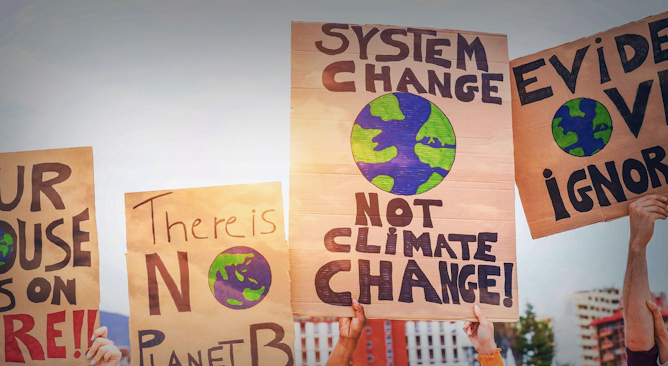
Arjuna Dibley, The University of Melbourne
A recently settled class action lawsuit against the Australian government could help drive greater disclosure of climate financial risk by governments, central banks and companies.
|
Weekend long reads
|
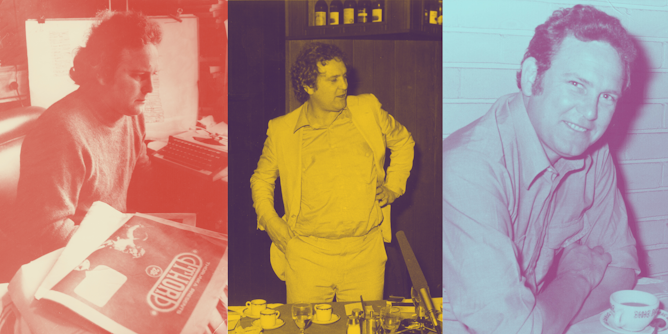
Frank Moorhouse.
Catharine Lumby, University of Sydney
Frank Moorhouse had a lifelong fascination with crossing borders – including the borders of gender and sexuality. It was reflected in both his life and his writing.
|
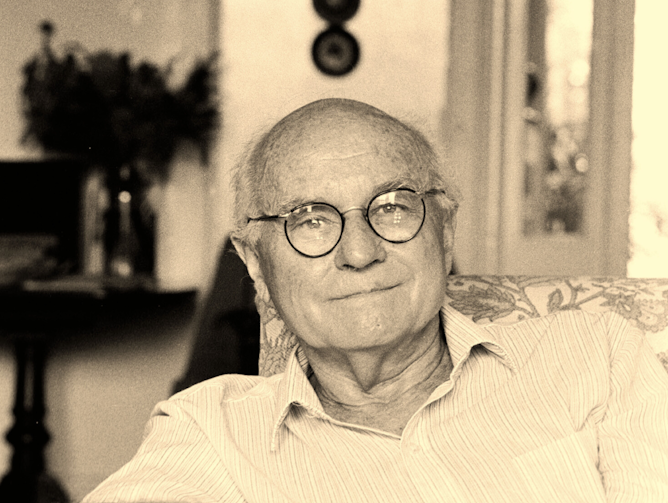
Donald Horne (1921-2005).
National Library of Australia, A.T. Bolton/AP
Julianne Schultz, Griffith University
Donald Horne’s genius was his ability to capture on the page a personal intellectual journey that reflected one the nation was also taking.
|
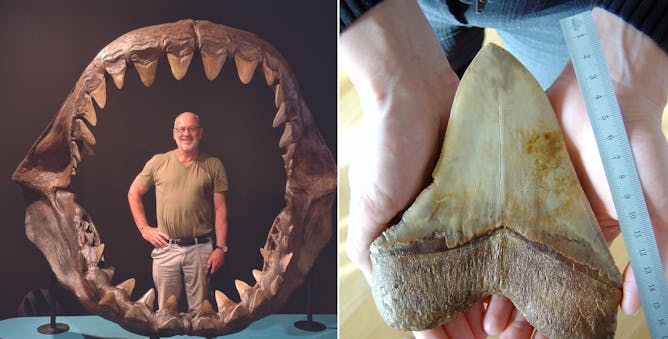
Tim Flannery with a model set of jaws of a megalodon at the Australian Museum, and, on right, a megalodon tooth.
Photos: Text Publishing, Wikimedia Commons
Vivienne Westbrook, The University of Western Australia
Megalodons are having a cultural moment. What do we know about them? And might further scientific discoveries reveal more about the true shape and size of these creatures?
|

Keith Luke/Unsplash
Brigid Rooney, University of Sydney
A new book designed to interest potential and beginning readers also offers plenty of new ideas to interest well-versed Murnanians.
|

Wikimedia Commons
Richard Colledge, Australian Catholic University
Simone Weil is one of the 20th century’s most remarkable, paradoxical figures. The Need for Roots, published in the year she died at just 34, is a tour de force of ethics and political philosophy.
|

Main image: Buchenwald concentration camp (AP). Inset: Ilse Koch mugshot.
Jens Meyer/AP
Olivera Simic, Griffith University
Ilse Koch’s husband was commandant of Buchenwald, one of Germany’s first and largest concentration camps. As the only woman among 31 people indicted for crimes committed there, she became infamous.
|
Our most-read article this week
|
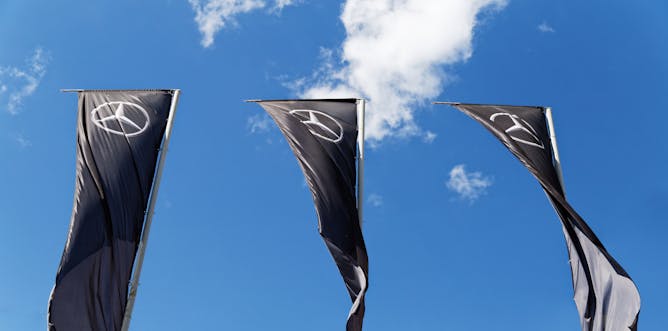
Vishal Mehrotra, Bond University; Rajat Roy, Bond University
In a landmark case for the Australian automotive industry, the Federal Court has ruled Mercedes-Benz is free to set fixed prices and sell direct to customers, rather than let dealerships haggle.
|
In case you missed this week's big stories
|
-
Rico Merkert, University of Sydney
Despite the change at the top, the Qantas board can expect to face a grilling from angry shareholders at the upcoming AGM.
-
Volodymyr Bilotkach, Purdue University
Qantas might not be facing such a scandal if stronger consumer protection rules had been in place in Australia in 2022.
-
Peter Tregear, The University of Melbourne
You’re the Voice reinforces the view that supporting the Voice to Parliament is an act of national reconciliation we can take together.
-
Andrew King, The University of Melbourne
Burning Man turned to mud. Korea’s Scout Jamboree ended in heat, a typhoon, evacuations and recriminations. Extreme weather threatens your favourite festival.
-
Michelle Grattan, University of Canberra
She was the longest-serving woman in the Senate’s history.
-
Sarah Legge, Australian National University; Jaana Dielenberg, Charles Darwin University; John Woinarski, Charles Darwin University
The Australian government has at last produced a serious plan to control an introduced predator that is a big reason this country has one of the world’s worst records for species extinctions.
-
Paul Strangio, Monash University
In years gone by, former prime ministers were often trusted confidants to their successors. Not so these days, when the trend has been for former leaders to make a swift exist from the parliament.
-
Michelle Grattan, University of Canberra
At a crack-of-dawn news conference at Canberra airport, King suggested the 2020 incident was a factor, although “there was no one factor that influenced my decision in relation to the national interest”.
-
Mark Sanderson, RMIT University; Julian Thomas, RMIT University; Kieran Hegarty, RMIT University; Lisa M. Given, RMIT University
It’s hard to remember life before Google, when the closest thing to it was your local librarian. Soon the search engine will be offering AI-based summaries in its search results.
-
Peter Martin, Crawford School of Public Policy, Australian National University
Former Reserve Bank and Treasury chiefs have gone on to run Westpac, the National Australia Bank, the ANZ, and Macquarie Bank. It makes regulating those banks hard.
-
Daniel Salisbury, King's College London
Despite the UN sanctions against North Korea, Russia is apparently trading weapons and technology which could help Pyongyang’s missile programme.
-
Melissa Conley Tyler, The University of Melbourne
A new strategy aims to overcome Australian businesses’ reluctance to engage more in Southeast Asia.
-
Isaac Gross, Monash University
Six charts explain the Australian economy. Three of the most disturbing show living standards going backwards, productivity collapsing and household saving falling to a 15-year low.
-
James Laurenceson, University of Technology Sydney
There are several good reasons why fears that a recession in China could spark a recession in Australia need to be kept in perspective.
-
William Partlett, The University of Melbourne
Constitutions are by nature short and incomplete documents. In Australia, parliament puts the flesh on the bones of the Constitution, including how a proposed Voice would operate.
|
|
| |
|
|
|
Auckland University of Technology
Auckland, New Zealand
•
Full Time
|

|
|
Auckland University of Technology
Auckland, New Zealand
•
Full Time
|

|
|
|
|
| |
| |

|
| |
| |
| |
Featured Events, Courses & Podcasts
|
View all
|
|
1 January 2023 - 7 October 2026
•
|

|
6 July - 6 October 2023
•
|

|
15 - 17 September 2023
•
Sydney
|

|
15 September 2023
•
Sydney
|

|
|
|
|
| |
| |
| |
| |
| |
|
|
|
|
|
|
|